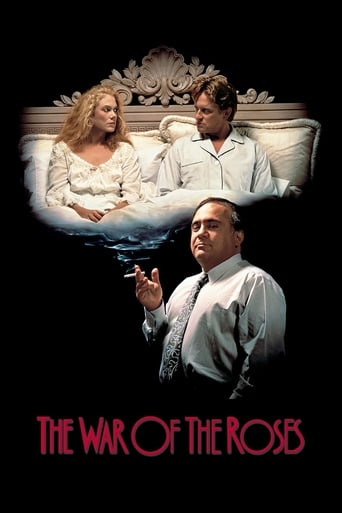Mr-Fusion
There isn't a plethora of funny lines in "The War of the Roses" (it's just not that kind of comedy), but the blistering cynicism about marriage makes them stand out all the same (the stabbing victim in the hospital claimed most of these). If you want to call this a cautionary tale of divorce, I'm just fine with that. Watching these people bitterly drift apart is uncomfortable, and the filmmakers know this because the whole third act is the literal destruction of everything they've labored so long to build. The absurdity is almost a salve.It's a comedy, but also dark as hell. The dialogue, on the other hand, that's fantastic.7/10
CinefanR
This gem of a movie oddly never got enough praise. It's a stroke of genius right there, and the whole thing is simply flawless. The screenplay is extremely clever and for once there are no compromises in this script. One can only admire the movie's commitment to the truth. It has a certain sincerity that I find absolutely refreshing, so those who call it "cynical" miss the point entirely. Marriage and its dissolution are dissected with a stunning finesse of psychological observation; it's all very funny, insightful, touching, ruthless, relentless. Three major stars in their prime (Douglas, Turner, De Vito)play their roles to perfection and deliver the best performance of their careers. One of the best films ever made (don't watch it on a first date though!)
gwnightscream
Danny DeVito directs and co-stars in this 1989 comedy starring Michael Douglas, Kathleen Turner and Dan Castellaneta based on the novel. This takes place in Washington, D.C. where we meet attorney, Gavin D'Amato (DeVito) who tells the story of ill-fated, married couple, Oliver (Douglas) and Barbara (Turner) Rose to a new client (Castellaneta). He begins with when they first meet to their troubled 18-year marriage ending in a tragic battle over their house. Oliver was a Lawyer, Barbara owned her own catering company and they had 2 children. Douglas, Turner & DeVito are terrific in this and David Newman's score is great as usual. I recommend this great comedy.
ElMaruecan82
Cinema provided countless examples of unforgettable love stories: Tony and Anita, Rick and Ilsa, Oliver and Jenny; which indirectly begged for a film that would finally pay tribute to the opposite feeling, the so-underrated hatred. And on that level, Danny De Vito, the director, did one hell of a job. In "Throw Momma from the Train", De Vito had already established his capability to mix between dark humor and Oedipian issues, in "The War of the Roses", the comedic aspect on which relies the greatness of the film, fails to hide its intelligent sociological commentary on marriage, and whatever can build it or make the most solidly built one literally collapse."The War of the Roses": the title is ironically very poetic as if it deliberately conveyed the ambiguity between love, flame and passion (roses) and probably the most violent, absurd yet representative constituent of humanity: the exercise of war. Indeed, and it's one of the strengths of the script, the hatred between Oliver (Michael Douglas) and Barbara Rose (Kathleen Turner) is never detached from the passion that made the love story possible, and this is essential to understand why the level of violence graduated in such a spectacular and disturbing way. On the surface, the story of the Roses is told from a divorce lawyer trying to convince a client that divorcing can be costly on many unsuspected levels. Fittingly, Danny De Vito uses a very solemn and almost stereotypical voice to introduce the couple; whose story starts as a fairy tale: Oliver and Barbara meet in an auction, and spend a romantic rainy evening followed by their most intense sex ever. Barbara decides that night that either it would be the most romantic night of her life, or she'd be the slut of all-time, Oliver can't picture himself with another woman … the romance begins.Everything in the picture looks so perfect, to comfort that fairy tale aspect, but there's something cleverly hiding behind the scenes, something that becomes more and more obvious as time goes by. Barbara is romantic and passionate, Oliver is caring and pragmatic, it seems so benign in the beginning but progressively, these aspects of their personalities trace two opposite roads that would shortcut any possibility of a durable relationship. Barbara is the typical housewife caring, furnishing and decorating the house she discovered herself, until it became the perfect home for the perfect happy family, while Oliver worked on the 'funding' department, and hard enough to get the money to achieve his personal success, correctly earning what his wife would spend for the family's sake. Somewhere in between, despite all the decent and good intentions, the passion is slowly fading, making more visible whatever separates Oliver and Barbara; from their visions of life to details as significant as the animal pets they chose for company… and little by little, we witness the erosion of a perfect model of stability.Interestingly, the movie's apparent neutrality doesn't deprive it from an intelligent dose of objectivity depending on the gender's perspective. The point is not to admit that Oliver loved Barbara and she was the one who started hating him, or that he was a selfish jerk and she was a collateral damage of his ambition, I think what the film achieves to accomplish is to make us root for the opposite gender, or at least try to understand what went wrong from the other side. I watched the film with my girlfriend expecting her to root for Barbara while she was on Oliver's side, as a reaction, I tried to understand Barbara and the diagnosis I came with is that she sacrificed an exhilarating feeling of freedom to build a family, and while she never doubted her husband's true love, she felt like he was loving his idea of the couple, more than the couple itself. Oliver loved an entity emptied from its passionate core and Barbara couldn't endure a loveless life. The performances of both Michael Douglas and Kathleen Turner are the perfect spice for a story that could have been insipid otherwise. Douglas is brilliant as a tender but laughably self-centered jerk while Turner pushes a certain level of sexy deliberate evilness as the counterpart of twenty years of eternal docility.The performances, the set-up, efficiently works to create an unforgettable third act, when the war can start, and if the movie doesn't avoid some predictable or over-the-top situations, it remains faithful to its own premise by showing how far a couple can go during a divorce. At one point it get so chaotic that we might find it unrealistic… but that's only if we consider it as a movie about divorce, when it's more about love and hate. Neither of them want to give up the house, not because it would be economically unacceptable, but for a simple matter of territoriality. And when money stops to be the main motive, when it's for such principles, when there's no way to reason each of the two protagonists, when basically both of them have nothing to lose, then the effects can become devastating. And the film is so dark and perverse, than it doesn't leave us with much optimism about the fate of Oliver and Barbara Rose.Love and hate are fruits from the same tree … and I guess one can't intensely hate a person if he hasn't experienced a totally opposite feeling. Passion is the driver of the most inspiring emotions but it also works as a double-edged sword when its effect is injected in our most negative thoughts. We hate someone we loved for having fooled us, and make us waste our lives, and life is too precious to be wasted. Hatred is driven by an attachment to our lives' ideals, and when these ideals are ruined, yesterday's beloved become today's enemy... and enemy is the right word for we're talking of a war, "The War of the Roses", Danny DeVito's black comedy gem.




